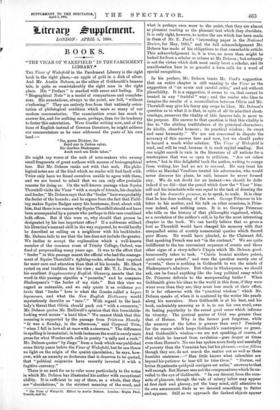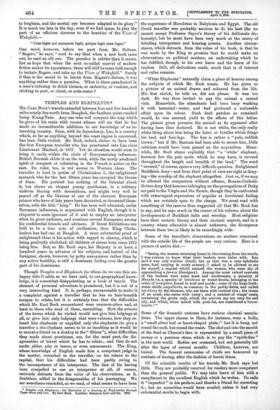BOOKS.
"THE VICAR OF WAKEFIELD" IN THE PARCHMENT LIBRARY.*
THE Vicar of Wakefield in the Parchment Library is the right
book in the right place,—an apple of gold in a dish of silver. And Mr. Austin Dobson, as the editor of Goldsmith's famous tale, is quite as unmistakeably the right man in the right place. His " Preface " is marked with sense and feeling. His "Biographical Note" is a model of compactness and complete- ness. His annotations, always to the point, are full, "without o'erflowing." They are entirely free from that untimely osten- tation of philological erudition which mars so many of our modern commentaries. The examination craze has much to answer for, and for nothing more, perhaps, than for its tendency to foster this ostentation. Were Goethe writing now, and of the bane of English instead of German literature, he might address our commentators as he once addressed the poets of his own land :—
"Ihr, gnten Dichter, ihr Seyd nur in Zeiten zahm. Sie machen Shakeepear Audi noch am Ende lahm."
He might say worse of the mob of note-makers who swamp small fragments of great authors with masses of lexicographical lore. But Mr. Dobson ranks not with that mob. His philo- logical notes are of the kind which no reader will find fault with. Twice only have we found ourselves unable to agree with them, and we are bound to admit that we can only offer probable reasons for doing so. On the well-known passage when Squire Thornhill visits the Vicar "with a couple of friends, his chaplain and feeder," Mr. Dobson says that the " feeder " here was probably the feeder of the hounds ; and he argues from the fact that Field- ing makes Squire Badger carry his huntsman, Scut, about with him, that there is no reason why Squire Thoriihill should not have been accompanied by a person who perhaps in this case combined , both offices. But if this were so, why should that person be designated by his less important office ? If a nobleman utilised his librarian's manual skill in the way supposed, he *ould hardly be described as calling on a neighbour with his bookbinder. Mr. Dobson fails to see that the less does-not include the greater.
We incline to accept the explanation which a well-known member of the common room of Trinity College, Oxford, was fond of propounding many years ago. It was to the effect that " feeder " in this passage meant the official who had the manage- ment of Squire Thornhill's fighting-cocks, whose food required far more care and attention than that of his hounds. Mr. Short rested on oral tradition for his view ; and Mr. T. L. Davies, in his excellent Supplementary English Glossary, asserts that the word in this passage signifies a "parasite," and he compares Shakespeare's "the feeder of my riots." But this view we regard as untenable, and we only quote it as evidence pro tanto that " feeder " here is what the Greeks called a hapax legomenon, and what the New English Dictionary would mysteriously describe as " rare-°." With regard to the land- lady's threat that Olivia should pack out "with a sussarara," Mr. Dobson quotes Mr. Halliwell's opinion that this formidable- looking word means "a hard blow." We cannot think that this meaning is supported by the passage from Tristram Shandy. "It was a Sunday, in the afternoon," said Corporal Trim, "when I fell in love all at once with a sisserara." The difference in spelling is immaterial; in both instances the word is surely mere prose for what Wordsworth calls in poetry "a sally and a rush."
Mr. Dobson quotes" by Jingo " from a book which was published some thirty years before the Vicar of Wakefield, but he can throw no light on the origin of the quaint ejaculation ; he says, how- ever, with an amenity so dexterous that it deserves to be quoted, that "political exigencies have recently invested it with a fugitive currency."
There is no need for us to refer more particularly to the notes in which Mr. Dobson has illustrated his author with exceptional ability. It is sufficient to say of them, as a whole, that they are " elucidations," in the strictest meaning of the word, and
• The Vicar of Walefitld. Edited by Austin Dobson. London Began Para, Trench, and CA what is perhaps even more to the point, that they are almost as pleasant reading as the pleasant text which they elucidate. It is only right, however, to notice the use which has been made in them of Mr. E. Ford's "interesting paper in the National Review, for May, 1883,". and the full acknowledgement Mr. Dobson has made of his obligations to that remarkable article. This acknowledgement is, it is true, no more than might be looked for from a scholar so urbane as Mr. Dobson ; but urbanity is not the virtue which doth most easily beset a scholar, and its manifestation here in so graceful a form calls for a word of special recognition.
In his preface, Mr. Dobson treats Mr. Ford's suggestion that an entire chapter is still wanting to the Viedr as the suggestion of "an acute and careful critic," and not without plausibility. It is a suggestion, it seems to us, that cannot be treated in any " frnitful " way ; and the reader who likes to imagine the results of a reconciliation between Olivia and Mr. Thornhill may give his fancy any scope he likes. Mr. Dobson's question as to what it is that, in spite of all its admitted short- comings, preserves the vitality of this famous tale, is more to the purpose. His answer to that question is that this vitality is due to "the abiding truthfulness of its principal characters; its kindly, cheerful humour ; its practical wisdom ; its sweet and sane humanity." We are not concerned to dispute the accuracy of this answer here and now, but we should prefer to hazard a much wider solution. The Vicar of Wakefield is read, and will be read, because it is such capital reading. But one might search in vain in the literature of all nations for a masterpiece that was so open to criticism. " Ars est celare artem," but in this delightful book the author, writing to escape from writing, has had no art to conceal. He may treat his critics as Marshal VendOme treated his adversaries, who would never discover his plans, he said, because he never formed any. We do not doubt for an instant—we should be dolts indeed if we did—that the pencil which drew the " Vicar " him- self and his inimitable wife was equal to the task of drawing the rest of his dramatis personre, so to speak, to scale. It is clear that he has done nothing of the sort. George Primrose in his letter to his mother, and his talk on other occasions, is Prim- rose indeed, and nothing more. It is no George Primrose who tells us the history of that philosophic vagabond, which, as a revelation of the author's self, is by far the most interesting chapter in the book. We can hardly believe that so gross a lout as Thornhill would have charged his memory with that unequalled series of acutely nonsensical queries which floored poor Moses. He would have pleaded, as the Claimant did, that speaking French was not "in the contract." We are quite indifferent to the too convenient sequence of events and those other signs of a story-teller's Utopia which Mr. Dobson good- humouredly takes to task. " Cuivis homini accidere potest, quod cuiquam potest ;" and were the question merely one of "events," there is nothing in Goldsmith to vex the minds of Shakespeare's admirers. But where in Shakespeare, we should ask, can be found anything like the long political essay which Dr. Primrose delivers to the masquerading butler ? When Goldsmith gives his ideas to the world in this form, if they were wiser even than, they are, they must lose much of their effect. It is far otherwise with the "practical wisdom" which Mr. Dobson speaks of, when it is scattered by the writer like pearls along his narrative. Here Goldsmith is at his best, and his book, undeniably amusing as it is, to use his own word, owes its lasting popularity to the sound good sense which informs its vivacity. The poetical genius of Ovid was greater than that of Horace. Why is the former poet forgotten, while the memory of the latter is greener than ever ? Precisely for the reason which keeps Goldsmith's masterpiece so green. And Goldsmith's wisdom—we are not speaking, of course, of that which he learned from revelation—goes deeper at times even than Horace's. No one has spoken more finely and manfully of poverty than the Vennsian has, but his phrases, curiose felices though they are, do not search the matter out so well as these humbler sentences :—" Man little knows what calamities are beyond his patience to bear till he tries them." "Durum, sod levius fit patientia quidquid corrigere est nefas," answer? to that well enough. But Horace sees not the compensations which lie un- veiled to the eye of Goldsmith. "In our descent from the sum- mits of pleasure, though the vale of misery below may appear at first dark and gloomy, yet the busy mind, still attentive to its own amusement, finds as we descend something to flatter and appease. Still as we approach the darkest objects appear to brighten, and the mortal eye becomes adapted to its glory." It is much too late in the day, even if we had space, to play the part of an officious cicerone to the beauties of the Vicar cf Wakefield,—
" Cras leget qui nunquam legit, quip() legit eras leget."
One word, however, before we part from Mr. Dobson. "Rogers," he says, "used to say that when a new book came out, he read an old one. The paradox is subtler than it seems. Let us hope that when the next so-called marvel of modern fiction makes its appearance, there will still be some bold enough to imitate Rogers, and take up the Vicar of Wakefield." Surely if that is the moral to be learnt from Rogers's dictum, it was anything rather than a paradox. • What is there paradoxical in a man's refusing to drink tintara, or carlowitz, or zoedone, and sticking to port, or claret, or soda-water ?















































 Previous page
Previous page